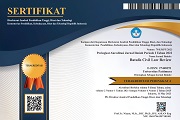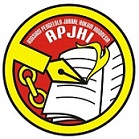Legal Consequences of Amendment And/Or Implementation of Homologation Outside Court Authorization
 ), Frandy Septior Nababan(2)
), Frandy Septior Nababan(2)
(1) Faculty of Law Pattimura University, Ambon, Indonesia
(2) Pranata Law Firm, Jambi, Indonesia
 Corresponding Author
Corresponding Author
Abstract
Keywords
DOI
10.47268/ballrev.v4i1.1468
Published
2023-05-02
How To Cite
@article{BALLREV1468,
author = {Wijaya Panjaitan and Frandy Nababan},
title = {Legal Consequences of Amendment And/Or Implementation of Homologation Outside Court Authorization},
journal = {Batulis Civil Law Review},
volume = {4},
number = {1},
year = {2023},
keywords = {Homologation; Bankruptcy; suspension of debt payment obligations; composition agreement.},
abstract = {The composition of Homologation that has been approved is ratified and decided by the court. But the problem is when composition that have been agreed and have been validated are then changed for certain interests so that the contents are no longer the same that has been validated. The purpose of this study is to find out how the legal consequences of amendments and/or the implementation of homologation outside the court. This study case uses a normative juridical method by using a statutory, case approach, and conceptual approach. Homologation composition through Suspension of Obligation for Payment and Bankruptcy have been regulated, so when there is a change and/or implementation of a composition agreement passed by the court (Homologation) outside the court, it is invalid.},
issn = {2746-8151}, pages = {51--66} doi = {10.47268/ballrev.v4i1.1468},
url = {https://fhukum.unpatti.ac.id/jurnal/ballrev/article/view/1468}
}
Amboro, F. Y. P. (2020). Restrukturisasi Utang Terhadap Perusahaan GO PUBLIC Dalam Kepailitan dan PKPU. Masalah-Masalah Hukum, 49(1), 103–111. https://doi.org/10.14710/mmh.49.1.2020.103-111
Anatami, D. (2021). Pengenalan Penundaan Kewajiban Pembayaran Utang (PKPU) dan Kepailitan. Deepublish.
Aprita, S. (2022). Meluruskan Logika Pemerintah Soal Kegentingan Moratorium UU Kepailitan dan PKPU. ADALAH: Buletin Hukum Dan Keadilan, 6(6), 11–27. https://doi.org/10.15408/adalah.v6i6.27582
Asyadie, Z. (2017). Hukum Bisnis Prinsip dalam Pelaksanaannya Di Indonesia. Raja Grafindo Persada.
Basiang, M. (2017). The Contemporary Law Dictionary. Gramedia Pustaka Utama.
Casanova, F. Y., Dwiatin, L., & Eka, D. (2018). Analisis Homologasi Dalam Penundaan Kewajiban Pembayaran Utang (PKPU) sebagai Upaya Pencegah Terjadinya Kepailitan (Studi Putusan No. 59/Pdt.Sus-PKPU.PN.PN.Niaga.Jkt.Pst). Pactum Law Journal, 1, 90–98.
Hartono, D. T. (2016). Perlindungan Hukum Kreditor Berdasarkan Undang-Undang Kepailitan. Jurnal Ilmu Hukum Legal Opinion, 4(1), 1–9.
Irianto, C. (2015). Penerapan Asas Kelangsungan Usaha Dalam Penyelesaian Perkara Kepailitan Dan Penundaan Kewajiban Pembayaraan Utang (PKPU). Jurnal Hukum Dan Peradilan, 4(3), 399–418. https://doi.org/10.25216/jhp.4.3.2015.399-418
Kornelis, Y., & Amboro, F. Y. P. (2020). Implementasi Restrukturisasi Dalam Prosesi Kepailitan Dan Penundaan Kewajiban Pembayaran Utang Di Indonesia. Jurnal Selat, 7(2), 237–277. https://doi.org/10.31629/selat.v7i2.1739
Korompis, V. R. (n.d.). Perubahan atas Perjanjian Perdamaian yang Telah Disahkan oleh Pengadilan Niaga. Kcaselawyer.Com. https://kcaselawyer.com/perubahan-atas-perjanjian-perdamaian-yang-telah-disahkan-oleh-pengadilan-niaga/
Manik, E. (2012). Cara Mudah Memahami Proses Kepailitan Dan Penundaan Kewajiban Pembayaran Utang. Mandar Maju.
Pramudita, S. A., Kartikasari, & Cahyadini, A. (2020). Kedudukan Hukum Menkominfo dalam Pelaksanaan Perdamaian menurut Undang-Undang Nomor 37 Tahun 2004 tentang Kepailitan dan Penundaan Kewajiban Pembayaran Utang. Legal Standing, 4(1), 101–117.
Purba, M., Sunarmi, Nasution, B., & Devi, K. (2019). Homologasi Penundaan kewajiban Pembayaran Utang (PKPU) sebagai Upaya Prefentif Terjadinya Pailit : Studi Kasus Putusan Mahkamah Agung No. 137K/Pdt.Sus-PKPU/2014. USU Law Journal, 7(2), 138–148.
Sastrawidjaja, M. S. (2010). Hukum Kepailitan dan Penundaan Kewajiban Pembayaran Utang. Premada Media.
Satrio, J. (1995). Hukum Perikatan, Perikatan Yang Timbul dari Perjanjian,. Citra Adiyta Bakti.
Sitompul, M. M. P. (2009). Penyelesaian Sengketa Utang Piutang Perusahaan dengan Perdamaian di dalam atau di luar Proses Kepailitan (Studi Mengenai Lembaga Penundaan Kewajiban Pembayaran Utang) [Universitas Sumatra Utara]. https://repositori.usu.ac.id/handle/123456789/33962
Sjahdeini, S. R. (2018). Sejarah, Asas, dan Teori Hukum Kepailitan Memahami Undang-Undang No. 37 Tahun 2004 tentang Kepailitan dan Penundaan Kewajiban Pembayaran Utang. Kencana Prenada Media Group.
Soeprapto, H. H. (1984). Pokok-Pokok Hukum Perikatan dan Hukum Jaminan. Liberty.
Stanly, V., & Tanawijaya, H. (2022). Kedudukan Kreditur Konkuren yang Membatalkan Perjanjian Perdamaian menurut Undang-Undang Nomor 37 Tahun 2004 tentang Kepailitan dan Penundaan Kewajiban Pembayaran Utang (Studi Putusan Nomor 02/PDT.SUS-Pembatalan Perdamaian jo, Putusan Mahkamah Agung Nomor. Jurnal Hukum Adigama, 5(2), 380–402.
Subekti. (2003). Pokok-Pokok Hukum Perdata. Jakarta: Intermasa.
Subhan, M. H. (2008). Hukum Kepailitan Prinsip, Norma, dan Praktik Peradilan. Kencana Prenada Media Group.
Supramono, G. (2013). Perjanjian Utang Piutang. Kencana Prenada Media Group.
Suyatno, R. A. (2017). Pemanfaatan Penundaan Kewajiban Pembayaran Utang Sebagai Upaya Mencegah Kepailitan. Kencana Prenada Media Group.
Syahrani, R. (2006). Seluk Beluk Dan Asas Asas Hukum Perdata. Alumni.
Yuhassarie, E. (2005). Undang-Undang Kepailitan dan Perkembangannya. Pusat Pengkajian Hukum.
| Dublin Core | PKP Metadata Items | Metadata for this Document | |
| 1. | Title | Title of document | Legal Consequences of Amendment And/Or Implementation of Homologation Outside Court Authorization |
| 2. | Creator | Author's name, affiliation, country | Wijaya Natalia Panjaitan; Faculty of Law Pattimura University, Ambon; Indonesia |
| 2. | Creator | Author's name, affiliation, country | Frandy Septior Nababan; Pranata Law Firm, Jambi; Indonesia |
| 3. | Subject | Discipline(s) | |
| 3. | Subject | Keyword(s) | Homologation; Bankruptcy; suspension of debt payment obligations; composition agreement. |
| 4. | Description | Abstract | The composition of Homologation that has been approved is ratified and decided by the court. But the problem is when composition that have been agreed and have been validated are then changed for certain interests so that the contents are no longer the same that has been validated. The purpose of this study is to find out how the legal consequences of amendments and/or the implementation of homologation outside the court. This study case uses a normative juridical method by using a statutory, case approach, and conceptual approach. Homologation composition through Suspension of Obligation for Payment and Bankruptcy have been regulated, so when there is a change and/or implementation of a composition agreement passed by the court (Homologation) outside the court, it is invalid. |
| 5. | Publisher | Organizing agency, location | Faculty of Law, Universitas Pattimura |
| 6. | Contributor | Sponsor(s) | Faculty of Law Pattimura University, Ambon; Pranata Law Firm, Jambi |
| 7. | Date | (YYYY-MM-DD) | 2023-05-02 |
| 8. | Type | Status & genre | Peer-reviewed Article |
| 8. | Type | Type | |
| 9. | Format | File format | |
| 10. | Identifier | Uniform Resource Identifier | https://fhukum.unpatti.ac.id/jurnal/ballrev/article/view/1468 |
| 10. | Identifier | Digital Object Identifier | 10.47268/ballrev.v4i1.1468 |
| 11. | Source | Title; vol., no. (year) | Batulis Civil Law Review; Vol 4, No 1 (2023): VOLUME 4 ISSUE 1, MAY 2023 |
| 12. | Language | English=en | en |
| 13. | Relation | Supp. Files |
LEGAL CONSEQUENCES OF AMENDMENT AND/OR IMPLEMENTATION OF HOMOLOGATION OUTSIDE COURT AUTHORIZATION (JURIDICAL ANALYSIS OF LAW NUMBER 37 OF 2004) (54KB) LEGAL CONSEQUENCES OF AMENDMENT AND/OR IMPLEMENTATION OF HOMOLOGATION OUTSIDE COURT AUTHORIZATION (JURIDICAL ANALYSIS OF LAW NUMBER 37 OF 2004) (54KB) |
| 14. | Coverage | Geo-spatial location, chronological period, research sample (gender, age, etc.) | |
| 15. | Rights | Copyright and permissions | Copyright: Authors who publish their manuscripts in this Journal agree to the following conditions: 1. The copyright in each article belongs to the author, as well as the right to patent. 2. Authors are able to enter into separate, additional contractual arrangements for the non-exclusive distribution of the journal's published version of the work (e.g., post it to an institutional repository or publish it in a book), with an acknowledgment of its initial publication in this journal. 3. Authors are permitted and encouraged to post their work online (e.g., in institutional repositories or on their website) prior to and during the submission process, as it can lead to productive exchanges, as well as earlier and greater citation of published work. 4. Authors have the right to self-archiving of the article (Author Self-Archiving Policy)
Licence : Batulis Civil Law Review Journal is disseminated based on the Creative Commons Attribution-NonCommercial 4.0 International license terms. This license allows anyone to copy and redistribute this material in any form or format, compose, modify, and make derivatives of this material for any purpose. You cannot use this material for commercial purposes. You must specify an appropriate name, include a link to the license, and certify that any changes have been made. You can do this in a way that is appropriate, but does not imply that the licensor supports you or your use.
|
Copyright (c) 2023 Wijaya Natalia Panjaitan, Frandy Septior Nababan

This work is licensed under a Creative Commons Attribution-NonCommercial 4.0 International License.

 : 1878 times
: 1878 times Download : 1242 times
Download : 1242 times














